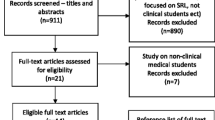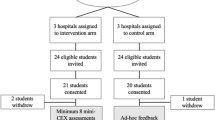Abstract
Introduction
Medical students use self-assessments to assess their knowledge and identify areas for additional study before taking a summative examination at the end of their clinical education segment. This study extended previous research on the NBME Clinical Science Mastery Series self-assessments to investigate the utility of recently released self-assessments for students completing Family Medicine clerkships and Emergency Medicine sub-internships and preparing for summative assessments.
Materials
The dataset included 12,200 Family Medicine and 3919 Emergency Medicine students who took the self-assessment and corresponding subject examination from the implementation of the self-assessments in 2017 through January 2020.
Results
Like other self-assessments, students typically took the self-assessment within a week of their Family Medicine or Emergency Medicine subject examination using the standard-paced testing mode. The proportion of variance in subject examination scores explained by self-assessment scores was slightly higher for the standard-paced group than for the self-paced group for Family Medicine, (R2 = .26 and .23, respectively); however, the pattern was reversed for Emergency Medicine (R2 = .29 and .32). Further, the two pacing groups had significantly different sets of regression parameter estimates.
Conclusion
The Family Medicine and Emergency Medicine self-assessments allow students to prepare for their summative subject examinations using formative assessments that mirror the content and pacing of the subject examinations. Students can also opt to use the self-paced mode to leverage the self-assessment as an educational tool. Although the standard-paced mode often provides better prediction of subsequent subject examination scores, the self-paced mode is also consistent with an assessment for learning framework.

Similar content being viewed by others
Data Availability
The datasets generated and/or analyzed during the current study are available from the corresponding author on reasonable request.
References
Schuwirth LW, Van der Vleuten CP. Programmatic assessment: From assessment of learning to assessment for learning. Med Teach. 2011;33:478–85.
Konopasek L, Norcini J, Krupat E. Focusing on the formative: building an assessment system aimed on student growth and development. Acad Med. 2016;91(11):1492–7.
McMillan J, Hearn J. Student self-assessment: the key to stronger student motivation and higher achievement. Educ Horiz. 2008;87(1):40–9.
Szpunar K, McDermott K, Roediger H. Testing during study insulates against the buildup of proactive interference. J Exp Psychol Learn Mem Cogn. 2008;34(6):1392–9.
Rohrer D, Taylor K, Sholar B. Tests enhance the transfer of learning. J Exp Psychol Learn Mem Cogn. 2010;36:233–9.
Butler A. Repeated testing produces superior transfer of learning relative to repeated studying. J Exp Psychol Learn Mem Cogn. 2010;36(5):1118–33.
Baghdady M, Carnahan H, Lam EWN, Woods NN. Test-enhanced learning and its effect on comprehension and diagnostic accuracy. Med Educ. 2014;48:181–8.
National Board of Medical Examiners. NBME Self-Assessment Services Voucher Program Guide. Philadelphia: National Board of Medical Examiners; 2020.
Morrison C, Smith L, Ross L, Butler A, Smith C. Learning through self-assessment: investigating the relationship between performance on the NBME clinical science mastery series self-assessments and clinical science subject examinations. Med Sci Educ. 2016;26:665–72.
Minor S, Stumbar S, Bonnin R. Impact of the introduction of the clinical science mastery series on family medicine NBME subject examination performance. Fam Med. 2019;51(8):687–90.
Sawhill A, Butler A, Ripkey D, Swanson D, Subhiyah R, Thelman J, Walsh W, Holtzman K, Angelucci K. Using the NBME self-assessments to project performance on USMLE Step 1 and Step 2: impact of test administration issues. Acad Med. 2004;79(10 Suppl):S55-57.
Morrison C, Ross L, Fogle T, Butler A, Miller J, Dillon G. Relationship between performance on the NBME Comprehensive Basic Sciences Self-assessment and USMLE Step 1 for U.S. and Canadian medical school students. Acad Med. 2010; 85(10 Suppl): S98–101.
Morrison C, Ross L, Sample L, Butler A. Relationship between performance on the NBME Comprehensive Clinical Science Self-assessment and USMLE Step 2 Clinical Knowledge for USMGs and IMGs. Teach Learn Med: Int J. 2014;26(4):373–8.
Author information
Authors and Affiliations
Corresponding author
Ethics declarations
Ethical Approval
This study was approved by the American Institutes for Research institutional review board.
Informed Consent
This was a retrospective study that used de-identified aggregate data.
Conflict of Interest
The authors are employed by the National Board of Medical Examiners.
Additional information
Publisher’s Note
Springer Nature remains neutral with regard to jurisdictional claims in published maps and institutional affiliations.
Rights and permissions
About this article
Cite this article
Morrison, C., Wise, J., Maranki, M. et al. Assessment for Learning: Investigating the Utility of the Family Medicine and Emergency Medicine Self-assessments for Subject Examination Preparation. Med.Sci.Educ. 31, 607–613 (2021). https://doi.org/10.1007/s40670-021-01230-0
Accepted:
Published:
Issue Date:
DOI: https://doi.org/10.1007/s40670-021-01230-0




